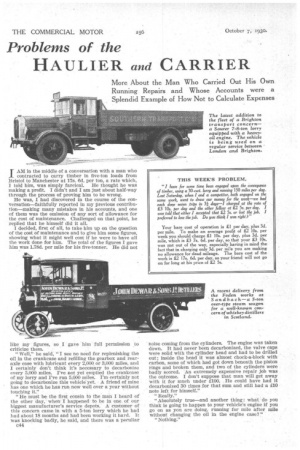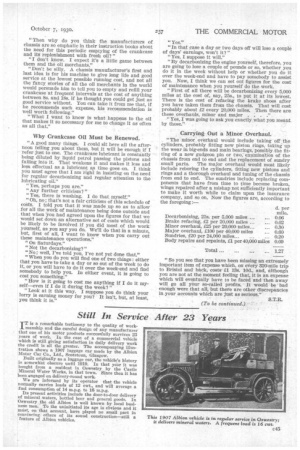Problems of the
Page 66

Page 67

If you've noticed an error in this article please click here to report it so we can fix it.
HAULIER and CARRIER
More About the Man Who Carried Out His Own Running Repairs and Whose Accounts were a Splendid Example of How Not to Calculate Expenses
AM in the middle of a conversation with a man who
contracted to carry timber in five-ton loads from Bristol to Manchester at 17s. 6d. per ton, a rate which, I told him, was simply farcical. He thought he was making a profit. I didn't and I am just about half-way through the process of proving him to be wrong.
He was, I had discovered in the course of the conversation—faithfully reported in my previous contribution—making many mistakes in his accounts, and one of them was the omission of any sort of allowance for the cost of maintenance. Challenged on that point, he replied that he himself did it all.
I decided, first of all, to take him up on the question of the cost of maintenance and to give him some figures, showing what it might well cost if he were to have all the work done for him. The total of the figures I gave him was 1.78d. per mile for his live-tonner. He did not
like my figures, so I gave him full permission to criticize them.
"Well," he said, "I see no need for replenishing the oil in the crankcase and refilling the gearbox and rearaxle case with lubricant every 2,000 or 3,000 miles, and I certainly don't think it's necessary to decarbonize every 5,000 miles. I've not yet emptied the crankcase of my lorry and I've run 5,000 miles. I'm,certainly not going to decarbonize this vehicle yet. A friend of mine has one which he has run now well over a year without touching it."
"He must be the first cousin to the man I heard of the other 'day, when I happenedto be in one of our biggest manufacturer's service depots. A customer of this concern -came in with a 5-ton lorry which he had had about 18 months and had been working it hard. It was knocking badly, he said, and there was a peculiar
c44 noise coming from the cylinders. The engine was taken down. It had never been decarbonized, the valve caps were solid with the cylinder head and had to he drilled out ; inside the head it was almost chock-a-block with carbon, some of which had got down beneath the piston rings and broken them, and two of the cylinders were badly scored. An extremely expensive repair job was the outcome. I don't suppose that man will get away with it for much under £100. He could have had it decarbonized 30 times for that sum and still had a £10 note left for himself."
"Really,"
"Absolutely true—and another thing: what do you think is going to happen to your vehicle's engine if you go on as you are doing, running for mile after mile without changing the oil in the engine case?"
"Nothing." "Then why do you think the manufacturers of chassis are so emphatic in their instruction books about the need for this periodic emptying of the crankcase and its replenishment with fresh oil?"
"I don't know. I expect it's a little game between them and the oil merchants."
"Don't be silly. A chassis manufacturer's first and last idea is for his machine to give long life and good service at the lowest possible running cost, and not all the fancy stories of all the oil merchants in the world would persuade him to tell you to empty and refill your crankcase at frequent intervals at the cost of anything between 8s. and 18s. if he thought you could get just as good service without. You can take it from me that, if he recommends such expense, his recommendation is well worth following."
"What I want to know is what happens to the oil that makes it so necessary for me to change it as often as all that."
Why Crankcase Oil Must be Renewed.
"A good many things. I could sit here all the afternoon telling you about them, but it will be enough if I refer just to one. The crankcase lubricant is constantly being diluted by liquid petrol passing the pistons and falling into it. That weakens it and makes it less and less effectual as a lubricant as time -goes on. I. think you must agree that I am right in insisting on the need for regular decarbonizing and regular attention to the lubricating oil."
"Yes, perhaps you are."
"Any further criticism?"
"Yes, there is washing. I do that myself."
"Oh, no ; that's not a fair criticism of this schedule of costs. I told you that it was made up so as to allow for all the work of maintenance being done outside and that when you had agreed upon the figures for that we would set down an alternative set of costs which would be likely to be involved if you did most of the work yourself, as you say you do. We'll do that in a minute, but, first of all, I want to know when you carry out these maintenance operations."
On Saturdays."
"Not the decarbonizing?"
"No ; well, I've told you, l've not yet done that." "When you do you will find one of two things : either that you have to take a day or so out of the week to do it, or you will have to do it over the week-end and find somebody to help you. In either event, it is going to cost you something."
"How is it going to cost me anything if I do it myself—even if I do it during the week?"
"Look at it this way. I suppose you do think your lorry is earning money for you? It isn't, but, at least, you think it is." "In that case a day or two days off will lose a couple of days' earnings, won't it?"
"Yes, I suppose it will."
"By decarbonizing the engine yourself, therefore, you are going to lose a couple of pounds or so, whether you do it in the week without help or whether you do it over the week-end and have to pay somebody to assist you. Now, I think we can set out figures for the cost of maintenance when you yourself do the work.
"First of all there will be decarbonizing every 5,000 miles at the cost of, say, 25s., to put it at its lowest. There is the cost of refacing the brake shoes after you have taken them from the chassis. That will cost probably about £2 every 20,000 miles. Then there are these overhauls, minor and major . : . ."
"Yes, I was going to ask you exactly what you meant by those."
Carrying Out a Minor Overhaul.
"The minor, overhaul would include taking off the cylinders, probably fitting new piston rings, taking up the wear in big-ends and main bearings, possibly the fitting of a new gudgeon pin or two examination of the chassis from end to end and the replacement of sundry small parts. The major overhaul would most likely include reboring the cylinders, fitting new pistons and rings and a thorough overhaul and tuning of the chassis from end to end. The sundries include replacing components that have from time to time become broken, wings repaired after a mishap not sufficiently important to make it worth while to claim upon the insurance company, and so on. Now the figures are, according to the foregoing:—
"So you see that you have been missing an extremely Important item of expense which, on eiery 320-mile trip to Bristol and back, costs £1 13s. 10d., and, although you are not at the moment feeling that, it is an expense which will eventually have to be faced and then sway will go all your so-called profits. It would be bad enough were that all, but there are other discrepancies in your accounts which are just as serious." S.T.R.












































































































